News
Community Anti-Drug Coalitions of America Features Ride with Pride
Coalitions in Action— Coalition for a Drug Free Muskegon County Helps Students Ride with Pride
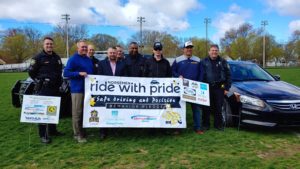
North Muskegon host their first Ride with Pride assembly.
Tell me about your community and the communities that your coalition serves. When was the coalition formed?
The Coalition for a Drug Free Muskegon County was formed in 2004 with a mission to reduce substance use disorder in Muskegon County, Michigan through education, prevention, and treatment. The coalition acts as one organizing body for over 50 community organizations and 90 active members. The coalition serves as a backbone to many sub-committees that focus on interacting with the community to achieve success.
What unique issues is your coalition facing?
“Muskegon County was once known as ‘Beer Tent Capital of Michigan,’” said Community Health Improvement Coordinator Rachel McCoy. “Summer celebrations, community events, and outdoor concerts allowed more access to alcohol and opportunities for drunk drivers and over-serving. In 2007, Muskegon’s student youth data showed 28% of high school juniors reported binge drinking in the past 30 days. Muskegon County also suffered from a significant number of alcohol-related car crashes involving youth. In December 2007, three teens were involved in a triple fatal car accident. They were able to purchase alcohol, underage, at a local alcohol retailer. Within a month, the community organized a town hall meeting on alcohol and later obtained a Strategic Prevention Framework (SPF) grant to reduce youth alcohol use in Muskegon County.”
“Since then, it has been the Muskegon Alcohol Liability Initiative’s (ALI) mission to reduce youth alcohol access, educate on the social, health, and legal consequences of alcohol use, and decrease alcohol-related car crashes in Muskegon. ALI established a plan through the SPF planning process to use data to drive action within the community. They relaunched their alcohol task force with new law enforcement members, new branding and a new name, the Muskegon Alcohol Liability Initiative.”

Orchard View High School host their 3rd Annual Ride with Pride assembly.
What activity or program is your coalition most proud of and/or what activity would you like us to spotlight?
“Our student data highlighted youth perceptions of risk for alcohol and tobacco use were very low, and that most youth were receiving incorrect information about the law and consequences of underage drinking from their peers,” said McCoy. “Since 2010, several successful initiatives have been implemented to combat these issues, such as retailer education, compliance checks, the FaceTheBook Campaign, and the Community College “Binge Effects” Campaigns.”
“While these initiatives continually hammered the message home about the safety, health and legal consequences of alcohol use, members began to discuss a different approach that would align with the school’s multi-tiered system of support as well as reinforce positive behaviors. Muskegon ALI members asked to implement the Ride with Pride student pledge along with the Positive Behavior Intervention and Support (PBIS) culture and climate program. In 2012, Mona Shores School District, the Norton Shores Police Department and Muskegon ALI launched their first Ride with Pride program. In the beginning of the year, the students are asked to sign a positive behavior pledge, which consists of positive behavior and choices the student needs to follow in order to be entered to win a car at the end of the year.”
“We learn that positive behavior is what motivates people to do the right thing, instead of always using the negative punishment side,” said Chief Jon Gale of the Norton Shores Police Department. “We need to be proactive and be involved with the schools to help educate kids and help them do the right thing.”
“The current initiative serves 4,800 students among seven high schools and middle schools, and hopes to expand to expand to 8,587 high and middle school students among an additional five school districts,” said McCoy. “This individual school-based approach engages community members on underage drinking, builds the capacity of communities to improve alcohol-related issues, and has a dramatic effect on local school climate and culture, including drops in violence and bullying, and students building positive relationships with teachers, administrators, and law enforcement.”
How did you get there, and what are your outcomes?
“Since 2012, Mona Shores High School saw a 51% decrease in school suspensions and in-school referrals for alcohol or other drugs,” said McCoy. “Mona Shores recently reported that this positive school climate has now impacted reading comprehension scores, which were up 13% in 2018.”
In the past 10 years, due to the efforts of the Muskegon ALI and the Ride with Pride Program, Muskegon County has seen:
- a 20% reduction in students reporting they ever drank alcohol since 2010
- a 37% decline in recent alcohol use
- a 48% reduction of binge drinking among youth
- a 61% reduction of youth riding with someone who had been drinking
In 2015, the Coalition for a Drug Free Muskegon County received the CADCA Got Outcomes! Award for our tobacco, alcohol, and prescription drug outcomes. The coalition has also received several state awards, was featured in the 2015 National Drug Control Strategy and the Office of National Drug Control Policy for Best Practices.
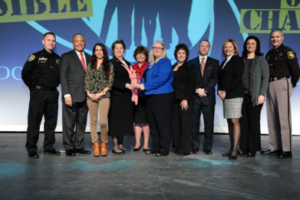
What advice would you give to other coalitions that may be addressing some of the same issues?
“Muskegon ALI and Ride with Pride are proud of our accomplishments and encourage this kind of prevention work in other counties,” said McCoy. “The best advice our coalition can give is collaboration. Collaboration with other community partners has been the key to this coalition’s success. Without the capacity of other partners, Ride with Pride would not where it is today.”
“Inviting key stakeholders to the table is also very important, especially when trying to develop ways to reach our youth. For example, developing relationships with school boards, principals, and school resource officers has been integral. Connecting with these individuals is a great way to get local schools invested in this program.”
To watch Mona Shore’s 2019 Ride with Pride Assembly, Click Here
About the Health Project: The Health Project, the Community Benefit Ministry of Mercy Health Muskegon, is an inclusive, community-based, decision-making, non-profit agency committed to improving the health of the community and the delivery of health care in Muskegon County and the surrounding West Michigan region. For more information about the Health Project, please give us a call at 231-672-3201 or visit mchp.org.
To learn more about CADCA, please visit https://www.cadca.org/resources/coalitions-action-coalition-drug-free-muskegon-county-helps-students-ride-pride
To learn more about Muskegon ALI, please visit www.muskegonali.org
Pharmaceutical Access Program: Navigating Resources to Best Assist the Client
“I take Trulicity and Toujeo and I am already in the coverage gap. I was wondering if there is any help for getting prescriptions. My cost for just these two is over $450, and I only get $600 a month. Thank you so much, if you can help.” This is just an example of a request we get every day for medication assistance when people’s expenses exceed their income and resources.
Another example: a mother brought in her son who was experiencing a change in insurance coverage. He was previously covered under Medicaid, but is now transitioning into Medicare. As his coverage was changing, they wanted to make sure that the Medicare drug plan he was auto-enrolled in would provide adequate coverage for the drugs he was currently using. As a member of our team reviewed the plan and his coverage, it was discovered that one of the key drugs he was taking was not on the formulary of the plan chosen for him. Upon this revelation, a comparison was made with other plans available through Medicare. A plan providing much better drug coverage was chosen, as well as health coverage, and he was enrolled the same day, providing no gap in his drug coverage.
“Pharmaceutical Access” is much broader than just funding the cost of prescriptions. It encompasses reviewing a person’s insurance coverage, income and resources, as well as medication needs. We then assist them with navigating insurance enrollment and coverage issues. It also includes exploring opportunities to utilize pharmaceutical company resources, such as copay saving cards and patient assistance programs. The Pharmaceutical Access Program staff look for savings and resources in all areas and help each client navigate those resources as needed. Providing assistance with funds through the hospital is the last resource utilized. Each year, the needs of those within our community continue to grow, so it is incumbent upon us to be good stewards of the resources available to us so we may serve as many as possible.
All Health Project staff work together to do the screenings necessary to provide pharmaceutical access to life-sustaining medications for persons who would otherwise struggle to obtain them. Each year, the Health Project’s Pharmaceutical Access Program serves over 3,000 clients and provides assistance for over 8,000 prescriptions.

The PAP Manager, Ron Rademacher, stated that, “The Health Project’s Pharmaceutical Access Program is important because of its efforts to assist our patients obtain the medications they require, as well as discern other needs they may have affecting their ability to stay healthy. Its mission is to protect and improve the overall health of our community one person at a time.”
Community Health Worker Alliance’s Legislative Day
Community Health Workers (CHWs) from Mercy Health Muskegon’s Health Project traveled to Lansing on April 10 to participate in Michigan Community Health Worker Alliance’s Legislative Day. CHWs from across Michigan met with their local legislators to share stories of challenges, impact and success in improving the health and social well-being of patients.
Carla Hines, Dawn Rymal, Edith Evans and Tressa Crosby, certified CHWs, met with Rep. Terry Sabo, and staff from Sen. Jon Bumstead’s office, as well as Rep. Greg Van Woerkom’s office. The Health Project deploys 28 CHWs to serve patients in the Lakeshore region.
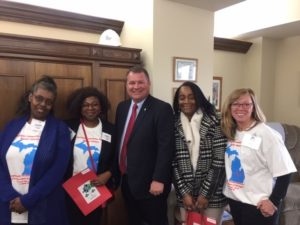
CHWs are trusted members of the community who help facilitate connection to the health care system, educate patients on managing chronic health conditions, enrollment into entitlement programs, and to address the social influencers of health.
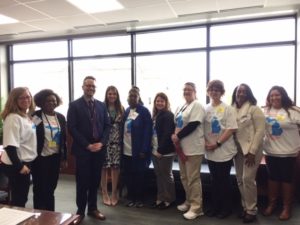
CHWs and CHW employers are seeking sustainable funding mechanisms to maintain and expand the availability of CHW services.
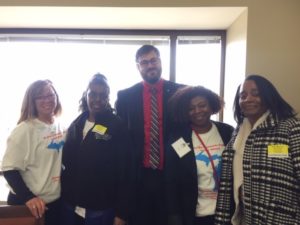
The UpFront Coalition: Raising Awareness During STD Awareness Month
In recognition of STD Awareness Month, the UpFront Coalition hosted their first community movie night at the Harbor Cinema Theater in Muskegon. The acclaimed musical, RENT, shows the struggles of a group of New Yorkers as the AIDS epidemic effects their community. Over 40 community members attended the free event and enjoyed $1 pop and popcorn during the movie! The coalition encouraged everyone to be “UpFront” about their sexual health and provided resources that included a list of free and confidential testing sites in Muskegon.
During the month of April, the coalition also launched their media campaign to increase awareness around free and confidential testing sites in Muskegon. The campaign features social media ads, bathroom ads, billboards, and hosting physician education lunch and learns that focus on reducing the negative stigma of being open about your sexual health. Muskegon County has the 2nd highest chlamydia rate and 3rd highest gonorrhea rate in the State of Michigan.
For more information about UpFront and a complete list of testing locations visit www.upfrontmuskegon.org.
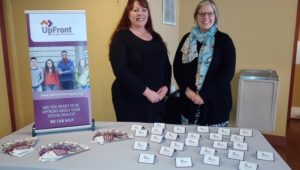
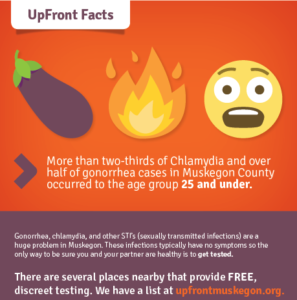
Muskegon High School Students Raise Awareness for Kick Butts Day 2019
The Knowsmoke Coalition partnered with students from Muskegon High School’s Youth Advisory Committee (YAC) to celebrate Kick Butts Day. Students were given the chance to share their reasons for not using tobacco and vaping products and “connect the dots” to encourage other students to be the next smoke + vape-free generation.
 Tyreese Oakes, a sophomore at Muskegon High School, explained, “I chose to be smoke free because I lost a family member to lung cancer and I want to set a good example for the rest of my family.” Tyreese shared how important it is for schools to step away from academics and teach students about the dangers of tobacco, vaping, and drugs.
Tyreese Oakes, a sophomore at Muskegon High School, explained, “I chose to be smoke free because I lost a family member to lung cancer and I want to set a good example for the rest of my family.” Tyreese shared how important it is for schools to step away from academics and teach students about the dangers of tobacco, vaping, and drugs.
 Over 500 “dots” were connected and presented in a collage near the high school’s cafeteria. The YAC students and Knowsmoke felt it was important that classmates share their reasons for why they stay smoke-free. Victoria, a 10th-grade student on the YAC, shared that, “Smoking comes with disgusting health risks, and I choose to relieve my stress by staying active.” The Youth Advisory Committee, coordinated by Joy Evans, works hard all year sharing the statistics on tobacco and vaping, and making sure kids have the tools to say “no” to tobacco and vaping.
Over 500 “dots” were connected and presented in a collage near the high school’s cafeteria. The YAC students and Knowsmoke felt it was important that classmates share their reasons for why they stay smoke-free. Victoria, a 10th-grade student on the YAC, shared that, “Smoking comes with disgusting health risks, and I choose to relieve my stress by staying active.” The Youth Advisory Committee, coordinated by Joy Evans, works hard all year sharing the statistics on tobacco and vaping, and making sure kids have the tools to say “no” to tobacco and vaping.

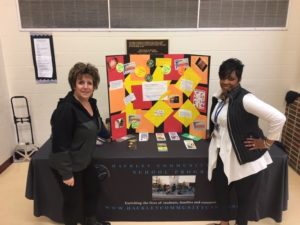
The Ride Hits Home For Health Project CHW
“It first started with chest pains,” stated Dave Alves, a Community Health Worker at the Health Project. “The pain wouldn’t go away, and I didn’t know I was bleeding internally. I remember making a few phone calls and calling my daughter, who lives in Florida. At that point, I didn’t realize how serious it was.”
“David had what’s called an aortic dissection, or tear in his aorta, and we took him to surgery as an emergency. He was in a critical state,” said cardiothoracic surgeon Dr. Richard Downey of Mercy Health Muskegon. Fifty percent of those with David’s condition don’t make it to the hospital.
Today, after 14 years, and 4,800 riders with over 55,000 miles, The Ride is the lakeshore’s premier indoor cycling event, and it has raised over $500,000 benefiting cardiac patients in need.
Dave participated in the 2019 The Ride to increase awareness in the community about cardiac related screenings and heart-healthy lifestyles. The Ride helps support free heart screenings for:
- Free heart screenings for high school students through the Mercy Health High School Heart Screening Program.
- Specialized equipment for patients receiving rehabilitation services at the Mercy Health Heart Center.
- Scholarships for those in need of cardiac rehabilitation, but whose financial or insurance-coverage status precludes them from receiving services.

Dave Alves with his doctor, Dr. Robert Downey, and his staff.
“I am here today because of surgeon Robert Downey and his staff. I was in critical care and then intensive care. His entire staff was amazing. I am eternally grateful for the care I received at Mercy Health”.
The 17th Annual Men’s Health Fair Offers Free Health Screenings
“So many young men who do not have insurance need to be covered. You’d be surprised that younger people are having more problems today. Early detection is the best defense for prostate and chronic health issues,” stated Jimmie Fox, Community Health Worker at the Health Project. 86 men, young and old, attended the 2019 Men’s Health Fair that took place on Saturday, February 16th at Muskegon Heights High School.
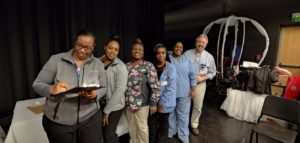 Since 2002, Mimi Rankin and her outreach team have seen hundreds of African American men screened for preventable chronic diseases, providing a need in the community. “Before the Affordable Care Act, the Men’s Health Fair was the only check-up that men would receive because we offer free health screenings. Now, families and young men have access to a family physician and resources in the community,” stated Ivory Morris, Community Health Worker on the Health Project’s Outreach Team.
Since 2002, Mimi Rankin and her outreach team have seen hundreds of African American men screened for preventable chronic diseases, providing a need in the community. “Before the Affordable Care Act, the Men’s Health Fair was the only check-up that men would receive because we offer free health screenings. Now, families and young men have access to a family physician and resources in the community,” stated Ivory Morris, Community Health Worker on the Health Project’s Outreach Team.
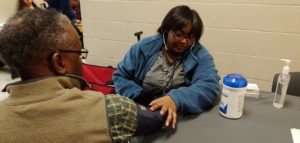 Screenings available this year were for diabetes, prostate, blood pressure, breathing tests, vision tests, and more.
Screenings available this year were for diabetes, prostate, blood pressure, breathing tests, vision tests, and more.
Community vendors to provide education and testing were the Knowsmoke Coalition, Walmart, BlueCross Complete, Mercy Health Nurses and Doctors from the Mercy Health Lab, Hackley Community Care, Muskegon Family Care, The Y, HealthWest, and a Muskegon Chapter of the A. Philip Randolph Institute to register voters.
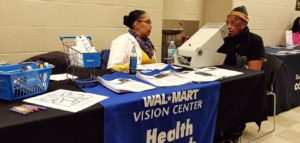
2017 MiPHY Infographics
The Michigan Profile for Healthy Youth (MiPHY) is an online student health survey offered by the Michigan Departments of Education and Health and Human Services to support local and regional needs assessment. The MiPHY provides student results on health risk behaviors including substance use, violence, physical activity, nutrition, sexual behavior, and emotional health in grades 7, 9, and 11. The survey also measures risk and protective factors most predictive of alcohol, tobacco, and other drug use and violence. MiPHY results, along with other school-reported data, will help schools make data-driven decisions to improve prevention and health promotion programming.
In Muskegon County, 13 school districts participate every two years in the MiPHY. Substance use prevention professionals, public health officials, educators, and MAISD staff collaborate on data-driven processes and strategic planning to enhance prevention efforts in Muskegon County. The MiPHY data drives the Drug Free Community of Muskegon County sub-committees, which are: Muskegon ALI, Knowsmoke, Muskegon Area Medication Disposal Program, Alliance for Marijuana Prevention Coalition (AMP), and the recently added Ride with Pride Coalition.
To view the 2017 MiPHY infographics, please click on the infographics below.
2017 MiPHY Infographics – Depression
2017 MiPHY Infographics – Nutrition,Physical Activity, and Wellness
2017 MiPHY Infographics – Safety
2017 MiPHY Infographics – Substance Use
2017 MiPHY Infographics – Violence and Trauma
For more information on the MiPHY and the DFC Data Committee, please contact Jill Keast at Public Health of Muskegon County or Ashley Westerlund at MAISD.
FY20 Community Benefit Board Initiative (CBBI) Grant Application Deadline EXTENDED
The Health Project Community Benefit Initiative Grant program was created to facilitate the investment of community benefit funds allocated to the Health Project’s Advisory Board of Directors by Mercy Health Muskegon. This discretionary fund supports initiatives and/or programs that address health needs identified in Mercy’s most recent Community Health Needs Assessment and Implementation Strategy, as well as strengthen and sustain our organizational Mission in the community.
Like all such programs, we expect the demand for these funds exceeds availability. For this reason, we have developed specific guidelines for funding that are intended to ensure that each request is evaluated fairly and that all applicants adhere to the intent of the program.
The Project Advisory Board is requesting proposals for the FY20 Community Benefit Board Initiative Grants. The Community Benefit Board Initiative Grants are awarded yearly to organizations for programs that address ranked issues in the 2019 Mercy Health Community Health Needs Assessment. This grant is open to all non-profits in Mercy Health’s service area of Muskegon, Oceana and Newaygo Counties.
Funding request for up to $25,000 will be considered.
The Health Project Board may award grants of $10,000 or less if funding is available after Principal grants are approved
All applicants are required to submit a Letter of Intent on the form provided to be considered for funding.
Deadline for Letters of Intent is March 20th at 5:00 P.M.
Deadline for application is April 5th at 5:00 P.M.
Application – CBBI Grant Application FY20 EXTENDED
Budget Template – CBBI Budget Template FY20
Quarterly Report Financial Template – CBBI Quarterly Report Financial Template
Recreational Marijuana Laws: What You Need to Know
Recreational Marijuana Laws: What you need to know
Voters in Michigan passed the recreational marijuana proposal in November. So what does this mean for Michigan? We hope this article answers some of your questions about the new recreational marijuana law.
What is Marijuana?
Marijuana, or cannabis, is a psychoactive drug from the cannabis plant. Marijuana can be smoked, inhaled as a vapor, added to food, or applied directly to the skin. Signs of marijuana use may include bloodshot eyes, increased heart rate, sleepiness, poor coordination, delayed reaction time, and increased appetite (American Addiction Centers, 2018; Narconon, 2018).
Medical Marijuana vs. Recreational Marijuana
• Medical Marihuana is still marijuana.
• The drug comes from the same grow operations.
• Having a medical card does not mean it can be picked up at a pharmacy like a prescription.
Marijuana is Classified as a Schedule 1 Drug under the Federal Government.
Marijuana/marihuana is a Schedule 1 Drug under the Michigan Public Health Code MCL 333.7212. A drug is a Schedule 1 if the Michigan Board of Pharmacy “finds that the substance has a high potential for abuse and has no accepted medical use in treatment in the United States or lacks accepted safety for use in treatment under medical supervision.”
Marijuana and the Workplace: High Doesn’t Get You Hired
- This includes the Controlled Substances Act, the Drug Free Workforce Act and the Drug-Free Schools and Communities Act. The Drug-Free Workplace Act of 1988 is an act of the United States, which requires some Federal contractors and all Federal grantees to agree that they will provide drug-free workplaces as a precondition of receiving a contract or grant from a Federal agency.
- Employers will continue to drug test potential employees during the hiring process; and if there were an accident onsite, it is possible the employer could be under the influence. Under proposal 1, it does not require employers to drug test.
- Employers still hold a zero-tolerance policy regarding drugs, which can result in termination.
Drugged Driving is Impaired Driving
- It is Illegal to drive under the influence of marijuana and/or any substance; it is illegal to consume substances while driving, and people cannot smoke marijuana inside the passenger compartment of a car or truck while it is on a public road. There is also an existing law that addresses operating a vehicle while under the influence, with passengers under the age of 16, that still applies. The penalty for breaking that law— MCL 257.625(7).
It is Illegal to Consume Marijuana in Public
- Individuals can have up to 2.5 ounces of marijuana on their person, and up to 10 ounces of marijuana in their home. Depending upon the potency of the marijuana, 2.5 ounces could produce as many as 100 joints or as few as 30. Individuals can have up to 15 grams of cannabis concentrates and up to 12 cannabis plants in the home.
It is Illegal to Take Marijuana Out of State
- Exporting recreational or medical marijuana from Michigan to other states is strictly prohibited and illegal under both Proposal 1 and the Michigan Medical Marijuana Act. Medical cannabis is only for the patient for whom it was purchased; and, therefore, cannot be sold, transferred or exported to anyone in or out of the State of Michigan. Forms of exporting include, but are not limited to, mailing, driving, shipping, flying or boating cannabis across state lines.
Cultivation Laws
Proposal 1 permits any adult 21 years of age or older to legally cultivate up to 12 cannabis plants in their residence, as long as there are no more than 12 plants total within the residence. Medical patients in Michigan are also allowed to cultivate their own plants. Under the Michigan Medical Marijuana Act, it is permissible for qualified patients or caregivers to cultivate up to 12 marijuana plants as well. Whether growing medically or recreationally, all cannabis plants must be grown inside locked, secured and enclosed facilities that are not visible to the public.
Youth Access is Still Illegal: No Matter How You Feel about Marijuana, it is Still Bad for Youth.
• It is illegal for anyone under the age of 21 to consume or purchase marijuana and THC-infused products.
• According the Michigan Profile for a Healthy Youth Survey (MiPHY), which is a survey administered by MDHHS to 12 schools in Muskegon County every two years, 1 in 3 high school students has tried marijuana, and 7 out 10 students who use e-cig products are 11 times more likely to vape marijuana.
Although legal cannabis was approved in Michigan, it is important to note that consumers will not be able to purchase it commercially right away. Initial predictions signal that Michigan’s cannabis sales will not begin until early 2020, as state lawmakers still need to iron out regulations and licensing.
For more information about the Marijuana Laws in Michigan, please review this document: An Overview of Michigan Recreational Marihuana Law
